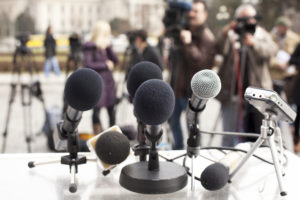
The News Conference
About to get grilled by a gaggle of news reporters? Learn how to control a news conference.
The news conference, unlike the public speech, involves only the media. It is called either to make a specific, important statement or to provide reporters with access to a representative of your organization for purposes of questioning. Remember, the representative is literally inviting interrogation in a public situation and must be prepared to handle potentially difficult questions. Such a news conference, however, does have the advantage of giving your organization an opportunity to state its position in depth, something not possible in a news release. Moreover, your representative can and probably will cover many issues. The result, if the news conference is set up and conducted well, is much better and more impressive news coverage.
Some points to remember on news conferences are:
- Call a news conference only if you have important news to break or if it is requested by the media — which will not happen very often because a news conference is time consuming and everyone gets the same story.
- Make sure that most of the reporters you want to attend are free to come. It is much better to make a few informal calls checking availability than to spend hours making arrangements only to discover that key reporters cannot make it.
- Check the deadlines of the major media and schedule the press conference so they can make these deadlines comfortably.
- Hold the conference in a central, easily accessible place that is comfortable, air conditioned and attractive. Think visually. TV reporters constantly seek the most exciting picture.
- Prepare your representative for a real grilling by the media. Play the devil’s advocate and raise every tough, embarrassing question that could conceivably arise. Make sure his/her answers are direct and concise, and his/her manner is friendly but firm and shows no sign of irritation or petulance, no matter what the provocation.
- Arrive well in advance to make sure the room is set up correctly. This means a covered table in front, with podium and room for microphones, rows of seats for reporters, and sufficient lights and outlets. Check the acoustics and set up coffee or soft drinks (if desired.)
- Greet the reporters at the door and ask if they need anything. During the period prior to the entrance of your organization’s spokesman, circulate and make sure everything is running smoothly.
- Begin promptly. Reporters are rightfully irritated when they make an effort to arrive promptly and are then kept waiting.
- Have the spokesman introduced briefly by someone who is known and respected.
- Have the spokesman open with a brief statement on the subject of the press conference. Then open the session for questions from the floor. Make sure you allow enough time for questions, which may be the most important and interesting part of the news conference.
Where in the World is Anthony?
Gave opening conference keynote this morning in Chattanooga, Tennessee. Presenting tip 48: Always type and double space your notes. Make the font size large enough for you to see 7 feet away. This allows you to move around, which makes you less boring.
Spoke this morning on Kiawah Island, South Carolina at a global chemical company's executive leadership meeting. Communications tip 27: People are constantly judging (often subconsciously) your non-verbal mannerisms. What is YOUR body saying?
Worked all day today in Campinas, Brazil with a global manufacturer. Messaging tip 12: Stick to 3-5 key points per topic. It forces prioritization. Less is definitely more.
Just wrapped day two in Sao Paulo, Brazil working with the Latin America leadership team of a a global chemical company. Small Talk Tip 9: Want to get better at small talk? Become a more interesting person. Want to become a more interesting person? DO interesting things.
Working this week in Brazil. Crisis comms tip 11: By the time you hear the thunder, it's too late to build the ark. Prepare now! Get a crisis communications plan, build a shadow website, collect contact info, write your AI messaging prompts, and so much more.